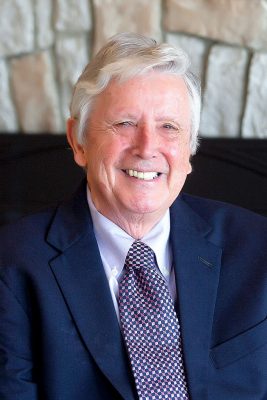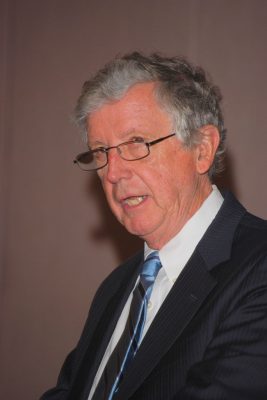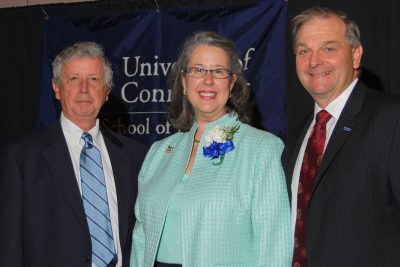
Mark R. Shibles of Wilton, Maine, a former dean and professor emeritus of the Neag School of Education, was a highly respected scholar and leader in educational leadership and policy. With his passing on Aug. 24, 2021, at 83, the Neag School honors Shibles’ impact and his legacy.
Leading as the Dean
Shibles had a 40-year career at UConn that included serving as dean of the School of Education from 1975 to 1987, a faculty member in educational leadership until his retirement in the mid-2000s, and an advisor for more than 130 Ph.D. students.
“As dean, he was well-liked and respected by faculty and staff, and he created an academic foundation that enhanced the national visibility and esteem of our School and our faculty, ultimately leading to highly regarded national rankings,” says Thomas DeFranco, professor emeritus and former dean of the Neag School.
Known for his very sharp and dry sense of humor, keen intellect, and outstanding leadership qualities, Shibles was recognized by principals and superintendents across the nation and developed policies that set the standard for effective administrative leadership at the K-12 level.
“His leadership helped the Neag School reach prominent status,” says Casey Cobb, Neag Professor of Educational Policy.
Shibles was a main reason Cobb says he took a position at UConn. Shibles, he says, had a “strong commitment to bettering the lives and children and uplifting communities through education … and it was a real draw to work alongside him.”
“Mark’s legacy lives on in those who had the privilege of coming in contact with him.”
— Casey Cobb, Neag Professor of Educational Policy
Looking back at Shibles’ 50-year career in education, which included teaching high school history, Cobb recalls how Shibles made significant contributions to the field of educational leadership and policy through his research, advocacy, teaching, and advising.
At the national and international levels, Shibles served on the board of directors of the American Association of Colleges for Teacher Education and was president of the National Association of Colleges and Schools of Education in State Universities and Land Grant Colleges and Affiliated Private Universities.
Cobb was impressed by Shibles’ ability to make connections in the field. “Maintaining relationships was important to him. He cared about the people he came in contact with, and his actions showed it,” Cobb says.
Even as a busy dean, and later as a professor, some days Shibles would get in his car and drive to see superintendents across the state. Most were current or former students with whom he kept in touch.
“He brought the administrators valuable information and direction,” says Mary Anne Doyle, professor emerita in curriculum and instruction. “He was also really respected by the State Department of Education. In addition, Shibles and the commissioner were very respectful of one another. Because of that, Mark had quite an impact on education at the state level as well.”
“He was a respected, go-to person, and educational leaders trusted his opinions and his insights.”
— Mary Anne Doyle, Professor Emerita
“Mark was an intelligent, very thoughtful, and a quiet leader,” she adds. “He was a respected, go-to person, and educational leaders trusted his opinions and his insights.”
UConn Board of Trustees Distinguished Professors Joseph Renzulli and Sally Reis recall Shibles helping them in their work in gifted and talented education.
“Mark took a personal interest in advancing the research of the faculty,” they say. “On one occasion, he arranged an important meeting with the Connecticut Commissioner of Education and several state superintendents of schools. This meeting resulted in research that changed guidelines for expanding the criteria for identifying gifted and talented students for participation in special enrichment programs.”
Dean Emeritus and Raymond Neag Endowed Professor of Educational Leadership Richard Schwab describes Shibles as always strategizing behind the scenes.
“He was forward-thinking, an educator who understood what it took to lead complex organizations,” says Schwab. “Shibles pretty much went about his business and was very smart. He knew how to work politics and to work politically, and he had great relationships with the education commissioner because he was respected and thoughtful.”
“He was forward-thinking, an educator who understood what it took to lead complex organizations.”
— Richard Schwab, Dean Emeritus

While serving as dean, Shibles was also superintendent of E.O. Smith High School in Storrs, Connecticut. E.O. Smith, located next to UConn Storrs, provided the opportunity for partnerships, research, and hands-on training for Neag School teacher education students. E.O. Smith would later become part of a school district, versus being managed through the Neag School, but it was something of which Shibles was proud.
During his deanship, he also was interested in expanding the School of Education’s educational leadership and policy expertise. “There was no real policy analysis center in Connecticut. So, Shibles founded the center, and we tried to turn it into a regional policy center for New England and the land grants. We worked hard at that,” says Schwab.
Establishing the center, says Cobb, “fulfilled a career-long desire” for Shibles. “He was among the first educational leaders to see the importance of policy and its potential impact to make lives better.”
“Mark was heavily devoted to low-income communities, whether in urban Connecticut or rural Maine. So much of his policy work targeted those areas, as he was always looking out for those at a structural disadvantage and finding ways to empower them,” adds Cobb.
One project that Shibles worked on through the Neag School’s Center for Education Policy Center was helping to develop a 2011 report titled “NextEd: Transforming Connecticut’s Education System,” which provided recommendations to the Connecticut Association of Public School Superintendents on revising its vision of schooling and social, economic, and political systems.
The center, Cobb says, “is thriving today because of Mark’s leadership and vision, and it has Mark’s signature all over it.”
Now known as the Center for Education Policy Analysis, Research, and Evaluation (CEPARE), the Center brings together faculty and graduate students to conduct research and advocate for policies that improve learning opportunities and environments for individuals and their communities.
Making an Impact Through Mentoring
Shibles was also known for lifting the people around him, helping launch and advance their careers. For example, during his deanship during the 1970s, Shibles hired one of UConn’s first African American associate deans, David Carter. Carter would later become president of Eastern Connecticut State University, the first African American to lead a four-year institution of higher education in New England.
As an advisor to numerous Ph.D. students, Shibles was known to stay in touch. Former doctoral student and former superintendent Bob Villanova, now a faculty member in the educational leadership department, recalls how Shibles made sure Villanova finished his doctoral work.
“I was an active principal in West Hartford, and I kind of lost track of my work,” recalls Villanova. “Mark reached out to me and pulled me back in, got me back involved to ensure that I stayed on track and finished.”
Villanova attributes completing his Ph.D. to Shibles. “The most important thing for me was the way he operated as I finished my coursework. He was influential in so many ways.”
While Shibles shied away from being in the spotlight and was known for being a behind-the-scenes leader, he committed to building leadership capacity among the people he worked with and advised.
Known as an influential professor, all the educational leadership doctoral students sought to take his courses. “That was one of the important hurdles to get through and benefit from,” recalls Villanova.

A former doctoral student, Schwab recalls Shibles walking the halls with his hands in his pockets, always deep in thought. “One of my first memories of him as a professor was that he was someone who asked tough questions,” says Schwab. “His classes were nondirective, getting the students to talk, but he would ask the critical questions to make you stop and think.”
“When they write the history of the Neag School of Education, Mark will be remembered as one of the most influential educators in its history, and one who provided the leadership that set the School on its current trajectory as one of the top schools of education in the nation,” says DeFranco. “He will be missed by all who knew him.”
“It remarkable to think of the hundreds of students Mark had in class and advised over his career, how much influence he had on them as individuals and professionals, and then the ripple effects of these relationships – the countless school children and families ultimately impacted,” says Cobb.
“Mark’s legacy is limitless and enduring,” Cobb adds. “Mark’s legacy lives on in those who had the privilege of coming in contact with him.”
 Facebook
Facebook
 Twitter
Twitter
 LinkedIn
LinkedIn
